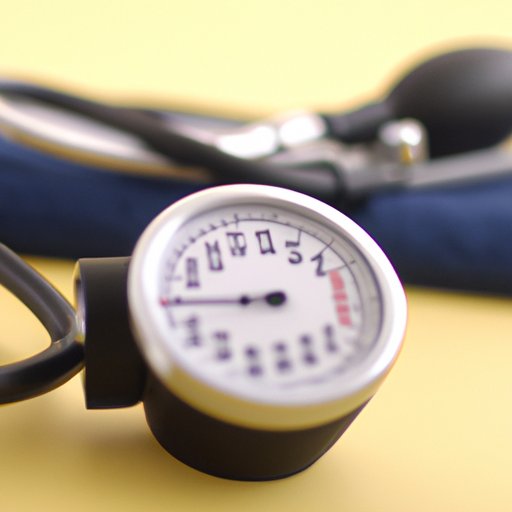
Introduction
High blood pressure, or hypertension, is a common health problem that affects millions of people worldwide. If left untreated, high blood pressure can lead to serious health issues such as heart disease, stroke, and kidney problems. The good news is that there are many things you can do to lower your blood pressure and reduce your risk of these health issues. In this article, we will provide practical tips for people who want to lower their blood pressure and improve their overall health.
Why Lowering Your Blood Pressure is Important
High blood pressure can have serious consequences if left untreated. It can damage your arteries and increase your risk of heart disease, stroke, and kidney problems. Lowering your blood pressure can reduce your risk of these health issues and improve your overall wellbeing. By maintaining a healthy blood pressure level, you can protect your body and enjoy a better quality of life.
Tips for Lowering Your Blood Pressure
A. Develop a Regular Exercise Routine
Exercise is one of the best things you can do for your health, including your blood pressure. Regular exercise can help strengthen your heart and improve blood flow, lowering your blood pressure over time. The American Heart Association recommends at least 150 minutes of moderate exercise per week, such as brisk walking or cycling. Strength training can also be beneficial. To make exercise a regular part of your routine, choose activities you enjoy, find a workout buddy for accountability, and schedule your workouts in advance.
B. Make Healthier Diet Choices
Diet plays a major role in blood pressure regulation. A healthy diet can help lower blood pressure and reduce your risk of heart disease and other health issues. To make healthier food choices, aim to include more fruits, vegetables, whole grains, and lean protein sources in your meals. Limit or avoid foods high in sodium, saturated fat, and cholesterol. Taking the time to plan your meals and reading nutrition labels can also help.
C. Cut back on Alcohol
Drinking alcohol in moderation is generally considered safe for most people. However, excessive drinking can raise your blood pressure. To lower your blood pressure, consider limiting your alcohol intake or avoiding it altogether. If you do choose to drink, do so in moderation: that means no more than one drink per day for women and two drinks per day for men. Choose non-alcoholic alternatives when socializing.
D. Manage Stress
Chronic stress can have a negative impact on your health, including your blood pressure. To manage stress, consider incorporating stress-reducing techniques into your daily routine, such as meditation, yoga, or mindfulness practices. Taking breaks throughout the day to engage in deep breathing or stretching can also help ease tension.
E. Quit Smoking
Smoking is a major risk factor for numerous health issues, including high blood pressure. Quitting smoking can improve your overall health and lower your blood pressure. If you need help quitting, there are many resources available, such as nicotine replacement therapies and support groups.
F. Maintain a Healthy Weight
Weight can have a significant impact on your blood pressure. If you are carrying excess weight, losing even a small amount can help lower your blood pressure. To maintain a healthy weight, focus on portion control, eat a balanced diet, and engage in regular exercise. Additional support, such as consulting a registered dietitian or personal trainer, can also be beneficial.
G. Monitor Your Blood Pressure
Regular blood pressure checks are important for maintaining healthy blood pressure levels. You can check your blood pressure at home with a blood pressure monitor. Understanding how to interpret your readings can also help you be proactive about your health. If you notice consistently high blood pressure readings, consult with your healthcare provider for additional support and guidance.
Conclusion
Lowering your blood pressure is an important step in maintaining a healthy body and reducing your risk of serious health issues. By following these practical tips, you can take control of your health and feel better overall. Remember to consult with your healthcare provider before making any significant changes to your lifestyle or medication regimen. For additional resources and support, consider reaching out to a support group or healthcare professional.




